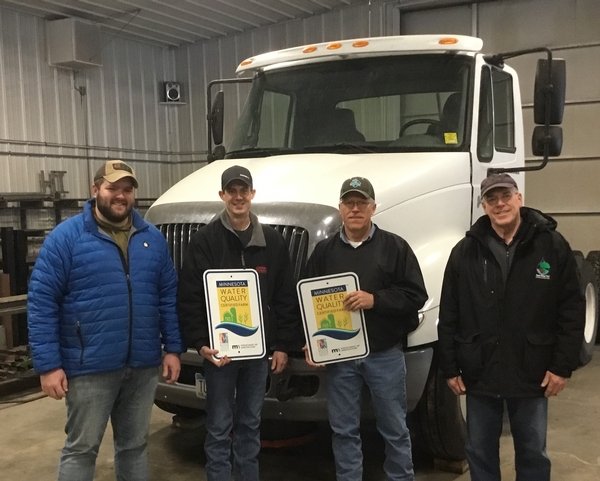
June 26, 2022 by Aaron Larsen
Mark Schoening and his son-in-law, Adam Fronning, both farm in Otter Tail County, near the towns of Underwood and Battle Lake. They work together as they each manage their farming operations and grow corn, soybeans, and wheat. They also work together in their efforts to protect our water and soil resources.
Because of their decisions to use a system of conservation practices, the Schoening and Fronning farming operations are both now Water Quality Certified in the Minnesota Ag Water Quality Certification Program (MAWQCP). Minnesota’s unique 7-year-old conservation program now includes 1,224 Water Quality Certified farming operations, in which producers are recognized for their efforts to protect the state’s water quality. These Water Quality Certified farms include small farms as well as large farming operations and represent a diversity of crop and livestock production.
Mark and Adam’s use of multiple conservation practices protect lakes, streams, and groundwater because: soil erosion is prevented; water runoff rates are reduced; and fertilizer is properly managed. Here’s how conservation is practiced on the Schoening and Fronning farms:
They practice no-till planting of soybeans into wheat stubble, in which soybeans are planted directly into the previous crop residue without any tilling of the soil. After growing corn and soybeans, conservation tillage is practiced, which keeps a significant amount of crop residue on the soil surface. Additionally, they are utilizing cover crops – which are planted after the soybeans reach maturity.
What are the benefits of their practices of no-till farming, conservation tillage, and cover crops? The soil is protected from erosion caused by wind or rain events, and runoff water slows down and better infiltrates the soil profile. Cover crops also greatly aid in increasing soil organic matter, suppressing weeds, and trapping nutrients.
Mark and Adam have built several water & sediment control basins (small dams) to control gully erosion caused by concentrated water flow on their sloping cropland. They’ve also installed grassed waterways.
On the Schoening and Fronning farms, grass filter strips or riparian (tree) buffer strips are established adjacent to the streams, ponds, and lakes on their farms. These vegetated areas trap sediment and nutrients before they enter the water.
Careful Nutrient Management and Pest Management: Mark and Adam follow University of Minnesota recommendations when they apply fertilizer to their fields, and they use University guidelines for soil sampling. When weeds, insects, and crop disease need to be controlled on their farms, they use techniques that protect water quality.
These conservation-minded decisions enable their farms to be Water Quality Certified, because water and soil are protected. Conservation is important to these producers. As Mark says: “I believe that we are here to be good stewards, and we need to good stewards of the soil and water. We want to pass on the land to the next generation in a better condition than it was when we started farming.”
Jim Lahn is the program’s Area Certification Specialist for 11 counties in north central Minnesota. Jim comments on Mark Schoening and Adam Fronning’s conservation efforts: “They can be proud of their good stewardship of natural resources. I appreciate that they choose to practice conservation on their farms, including no-till farming and use of cover crops. They’ve made important decisions that protect our water and soil resources.”
Farm operators and owners throughout Minnesota are eligible to be involved in the Minnesota Ag Water Quality Certification Program. Producers interested in learning more can contact their local Soil & Water Conservation District office or Jim Lahn at (218) 457-0250.
Posted in: News
